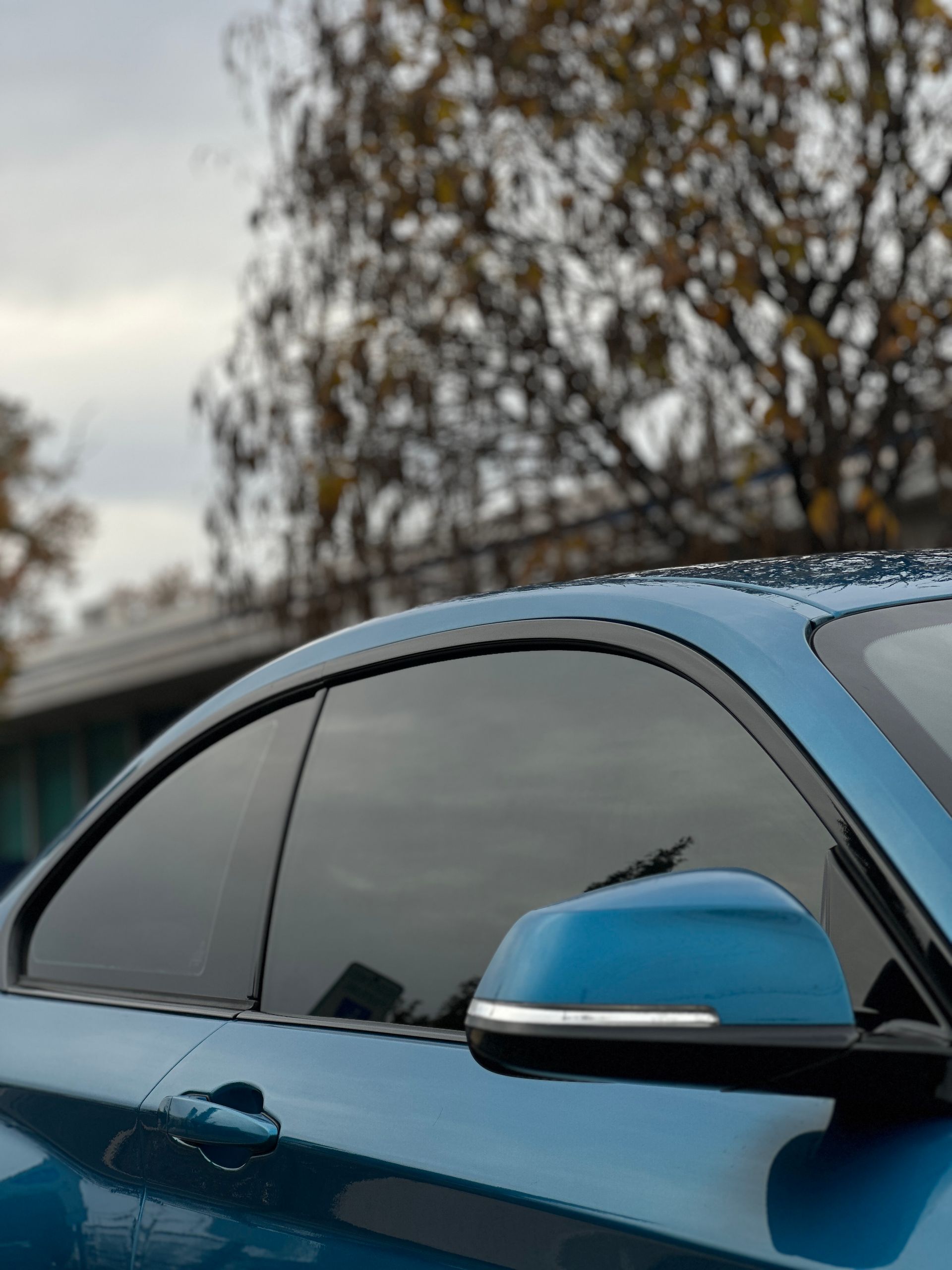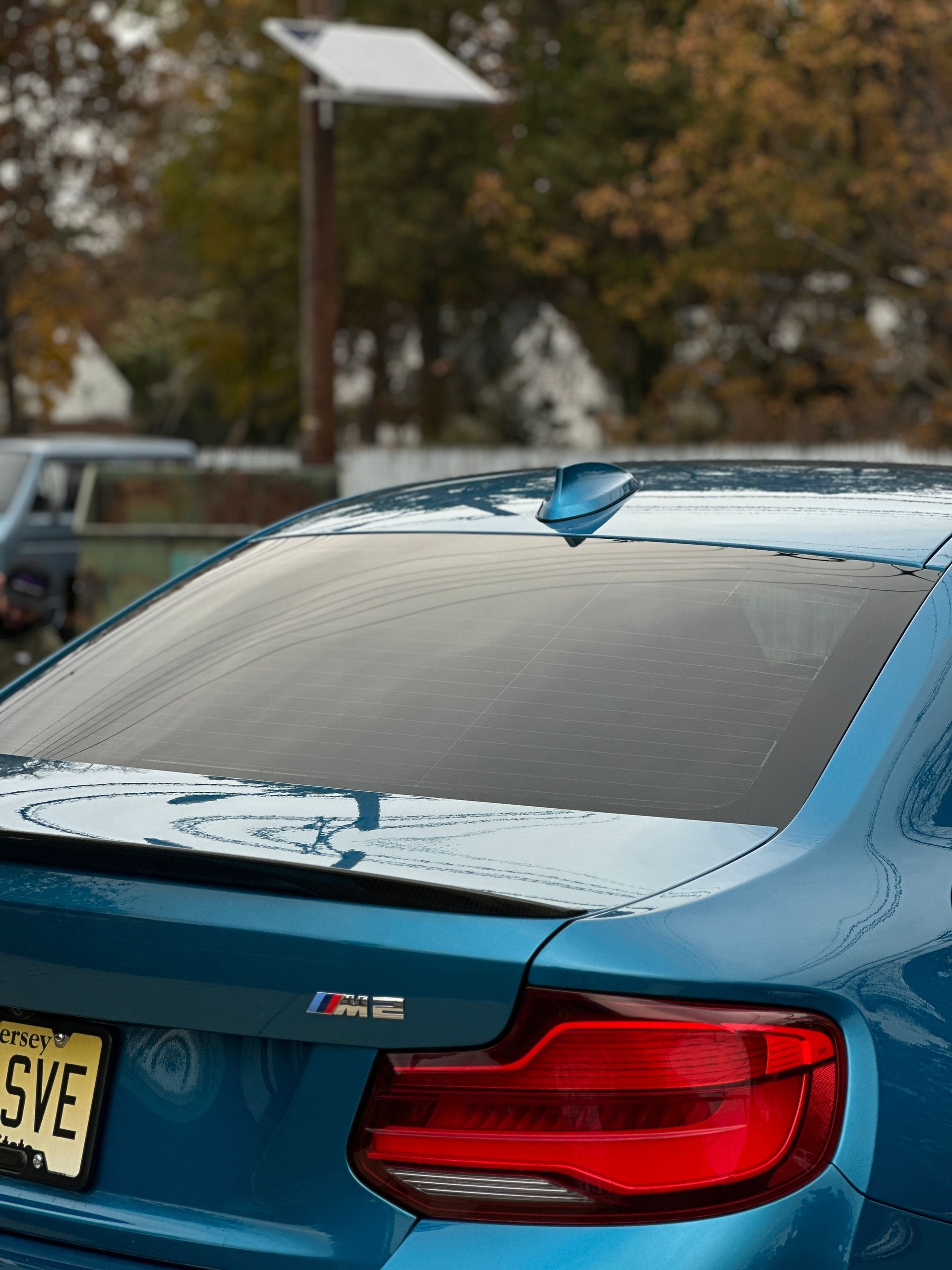Auto Window Tinting: The Ultimate Guide to Heat-Reducing Properties and Benefits
GET A FREE ESTIMATEWhen summer rolls around, many of us dread the sweltering heat that makes our cars feel like ovens. You might wonder if there's a way to cool things down without cranking up the air conditioning—auto window tinting! Not only does it add an extra layer of style to your vehicle, but it can also transform your driving experience by keeping the interior noticeably cooler.
Auto window tinting reduces heat by applying a specially designed film to the windows that blocks a significant amount of infrared (IR) radiation from the sun. This technology helps maintain cooler interior temperatures, making for a more comfortable driving experience, especially during hot weather conditions.
The Role of Window Tinting in Heat Reduction
At its core, auto window tinting functions by disrupting the influx of solar energy into your vehicle. This innovative technology operates primarily through two processes: reflection and absorption of heat. Tinted film acts as a barrier that reflects sunlight away while simultaneously absorbing the remaining heat that does manage to penetrate the glass.
Different Types of Tints and Their Capabilities
- Dyed Film: This basic option absorbs solar heat, leading to some relief by thwarting heat entry into the car, but it only offers minimal protection compared to its counterparts. While it provides privacy and enhances aesthetics, its durability and UV protection are limited.
- Metalized Film: By incorporating tiny metallic elements within the film, this option enhances heat rejection further as it reflects solar rays. However, these films can occasionally disrupt electronic signals, so if you rely on keyless entry or GPS, be mindful.
- Ceramic Film: The crème de la crème of window films employs ceramic particles that reflect nearly 99% of harmful UV rays and significantly block infrared radiation. This type emerges as a formidable force against heat gain, providing an unparalleled driving experience.
The Science Behind UV and Infrared Blocking
To grasp why auto window tinting is so effective, it's essential to explore UV and infrared radiation. Starting with ultraviolet (UV) radiation, this component of sunlight holds significant energy, capable of causing harm to both our skin and the materials within our vehicles. Prolonged exposure to UV rays can lead to skin issues, including premature aging and even skin cancer, which underscores the importance of window tinting.
- UV Radiation Blocking: Quality window films include specific UV-blocking chemicals that either absorb or reflect these harmful rays. It's fascinating to see just how proficient tints can be; for instance, a high-quality window tint can block up to an impressive 99% of UVB and UVA radiation. This means that when you're sitting in your car—be it during that summer road trip or daily commute—you’re significantly reducing your risk of sun damage while also protecting your vehicle's interior from fading.
- Infrared Radiation Blocking: Moving onto infrared (IR) radiation, it plays a crucial role in elevating cabin temperatures. Unlike UV rays, infrared rays carry thermal energy, which penetrates car windows and makes interiors uncomfortably warm. As the sun beats down on your car, those IR rays can elevate temperatures inside by **15-20°F (8-11°C)**—a notable increase that no one wants after returning from errands.
Understanding these functionalities highlights how critical it is to choose the right type of window film for tinting. Each film offers distinct benefits based on its composition and design, so opting for high-quality films tailored to block both UV and IR radiation will drastically improve the driving experience while safeguarding health and the vehicle's longevity.
Types of Window Films for Cars
When it comes to tinting your car windows, the market offers several types of films, each one tailored to meet specific needs and preferences. This array of options can be a bit overwhelming, but let's break it down to uncover their unique characteristics and benefits.
- Dyed Window Film: At the entry level, we have dyed window film, which is often the most budget-friendly option available. This type of film works primarily by absorbing solar heat and provides a degree of privacy due to its dark appearance. While it cuts down on glare, its ability to block UV rays is limited compared to other options. The main drawback? Dyed films tend to fade over time, especially when exposed to direct sunlight, leading to a need for eventual replacement.
- Metalized Window Film: Metalized window films are created with tiny metallic particles that reflect both heat and light. This means they are more efficient than dyed films at reducing heat buildup inside your vehicle. However, there’s something important to consider: While they perform admirably in terms of insulation, metalized films can interfere with GPS signals and cell phone reception because of those reflective materials. If you value technological connectivity as much as comfort in your car, this may be something you want to keep in mind.
- Ceramic Film: Ceramic films represent the pinnacle of window tinting technology currently on the market. Not only do they excel in blocking UV rays and infrared radiation—offering superior protection from heat—they also feature materials that won’t disrupt electronic signals. They are durable by design, retaining their properties far longer than dyed or metalized options. While ceramic films typically come at a higher price point, many see them as worth every penny for their long-lasting benefits and superior performance.
Each type offers distinct benefits and considerations, guiding consumers towards the right fit based on personal needs and lifestyle choices.
Additional Benefits of Auto Window Tinting
- UV Protection: One of the standout features of high-quality window tints is their incredible UV protection. They are engineered to block up to 99% of harmful UV rays, protecting both the occupants from skin-related issues—such as premature aging and even skin cancer—and safeguarding the car's interior. Imagine stepping into your vehicle on a hot summer day; without tinting, the upholstery might have been sun-bleached over time, leading to unsightly fading and cracking. However, with trusted tints applied, you can maintain the original beauty and quality of your car's interior.
- Glare Reduction: When it comes to glare reduction, tinted windows play an invaluable role in enhancing driving comfort and safety. Tints effectively minimize glare caused by sunlight or oncoming headlights, which many drivers find distracting or blinding. During extended road trips, having properly tinted windows reduces eye strain significantly. Instead of squinting against bright lights, drivers feel more relaxed and focused on the road ahead. Studies indicate that effective glare reduction leads to less driver fatigue over long distances, translating into safer journeys for both you and others on the road.
- Privacy and Security: Privacy and security are crucial considerations when opting for window tinting. Tinted windows create a barrier that limits visibility into your vehicle, beneficial in deterring potential thieves looking to snag valuables left in plain view. This added layer of security can make you feel more at ease when parked in public spaces or even in your driveway. Plus, vehicles fitted with darker window films generally offer increased privacy for you and your passengers. For those who value confidentiality during daily commutes or road trips, investing in darker films is a wise choice.
- Aesthetic Appeal: Let's not forget about the aesthetic appeal! Many car enthusiasts appreciate how tinted windows contribute to the overall look of their vehicle. The chic and refined appearance adds sophistication that elevates even the most basic models. When driving around showcasing your well-tinted windows, it feels like presenting a polished piece of art rather than just a means of transportation.
Legal Considerations for Window Tinting
Legal regulations surrounding window tinting can differ dramatically from one state to another, essentially painting a complex landscape for car owners. One key factor that states typically regulate is Visible Light Transmission (VLT), which measures the percentage of visible light allowed through tinted windows. This percentage plays a pivotal role in ensuring that drivers have adequate visibility while adhering to safety protocols.
It's crucial to always verify the local laws regarding tinting before proceeding with any installation. Failure to do so can result in fines or mandates to remove the unwanted tint, leading to a frustrating experience. Beyond just VLT, other considerations come into play. Reflectivity, which refers to how much light reflects off the window, also has legal limits to enhance safety and reduce glare. Some states impose restrictions on certain colors, making it vital for consumers to understand what’s permissible.
While some might view these regulations as overly restrictive, they exist primarily for safety reasons. Enhanced visibility not only keeps you safe but also protects other drivers and pedestrians by ensuring everyone can see each other clearly on the road. With varying laws across states, it's evident that tinting your car's windows isn't just about style—it’s a balance of appearance, function, and compliance. Always consult with auto tinting professionals familiar with the legal landscape in your area, as they can guide you toward choices that keep you within the boundaries of the law while enhancing comfort and safety in your vehicle.
Expert Window Tinting in Fair Lawn, NJ
Transform your vehicle with
premium window tinting services from Automotive Specialty Wraps in Fair Lawn, NJ. Our high-quality tints not only enhance your car's sleek appearance but also provide superior UV protection, reduce glare, and keep the interior cooler. With precise application and a variety of tint options, our experts ensure a flawless finish that complements your car’s style while protecting your investment. Upgrade your ride today—schedule your window tinting appointment and enjoy a cooler, more comfortable drive! Call us at (862) 268-2163 to get started!






